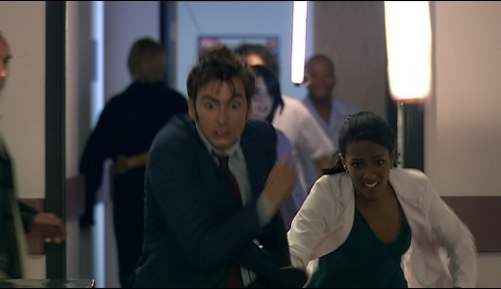
Out of David Tennant’s three seasons as the Tenth Doctor, his middle year, Series 3, is my personal favorite, and Russell T. Davies certainly gets the series off to a strong start with “Smith and Jones”, one of his most tightly-plotted episodes. During Series 2, the show often had a problem with meandering, low-energy episodes that struggled to keep the audience’s attention. Series 3 managed to side-step this problem with some clever writing decisions. Nearly every episode of Series 3 puts pressure on the Tenth Doctor and Martha Jones to save the day in some manner: they either have to race against a ticking clock, or they have to work at a great disadvantage compared to the villains.
For example, Ten only has a few hours to find Martha in the world’s largest traffic jam on a planet he knows little about, or else she’ll be crushed to death by giant crab monsters. Or Ten and Martha only have forty-two minutes to stop a spaceship from falling into a living sun (that’s currently trying to kill them with zombies) or else they’ll all burn alive. Or Martha has to find a way to fight off the Family of Blood while the Doctor’s soul is trapped inside a fob watch, where he can’t help her for a change. Or the Doctor, Martha and Captain Jack have to try to find a way to stop the Master from taking over the world, when he’s every bit as smart as the Doctor and he’s had plenty of time to set traps for them. Despite there being a radically different sense of scale every week, there’s always a sense of constantly rising stakes throughout Series 3 because the Doctor and Martha have to work hard to earn their victories, and they often have to face several different dangers at once. “Smith and Jones” officially kicks off that trend: in this episode, the Doctor and Martha only have an hour or two to track down a space fugitive, or they will either be killed by a vampire, killed by the Judoon, or suffocate to death on the moon from running out of oxygen.
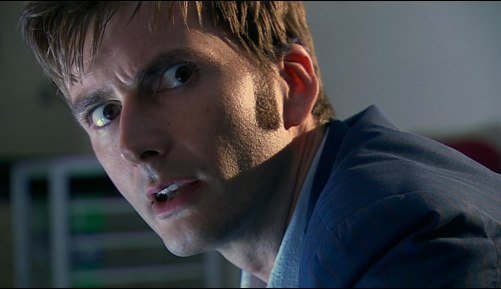
By all rights, “Smith and Jones” is a pretty standard adventure for the Tenth Doctor (David Tennant), albeit with more of a time crunch than usual. When the Doctor decides to investigate strange occurrences at a London hospital, he gets whisked away to the moon with all the patrons and the hospital’s staff, so he quickly sets about trying to find an alien fugitive, with the help of an unexpected partner. While most of the focus is kept on characterizing Martha in her introductory episode, we do get some additional insight into Ten’s personality in this series premiere. Right from the start, Ten has been characterized as a Doctor who’s a daring thrill-seeker, so he not only works well under pressure, he almost seems to thrive under it. He bounces along throughout the episode, dragging Martha and the audience along for the ride through sheer of force of will and personality, encouraging them to keep up with his technobabble. He’s someone who’s utterly mad yet completely brilliant, as well as cheeky, determined and resourceful, working around the Judoon and the Plasmavore.
As we’ve seen in “The Christmas Invasion“, Ten has a very hands-on personality and he prefers to do everything himself whenever he can, but he’s willing to delegate pressing tasks when he knows he’s dealing with capable hands, putting Martha on the hot-spot for the first of several times this season when he asks her to distract the Judoon. The Doctor’s manipulative streak is something we don’t see as often with Ten compared to some of his other incarnations, but I always enjoying watching him employ reverse psychology on people. During the climax, Ten pretends to be a naïve, human fool (and he does a convincing job of it) to trick the Plasmavore into drinking his blood and draw her out of hiding, essentially sacrificing himself to save everyone else in the hospital.
Series 3 marks a significant change when it comes to the Doctor’s characterization. In Series 1, Rose was the audience’s point-of-view character while Nine was something of a mystery for the first half of it. And while the Doctor had several focus episodes in Series 2, he was also defined as one-half of the Ten / Rose duo, which made their forced separation in the finale all the more painful. In Series 3, now that Rose is gone, the show spends a lot more time delving into what makes Ten tick as an individual, like his love of Shakespeare in “The Shakespeare Code“, how much he misses Gallifrey in “Gridlock“, his relationship with the Daleks in “Evolution of the Daleks“, his views on immortality in “The Lazarus Experiment“, how much he enjoyed living a simple, human life for a short time in “Human Nature“, his optimism for the future in “Utopia“, and his relationship with the Master in “The Sound Of Drums”. While he always had a pivotal role in Series 1 and 2, Series 3 truly marks the point where the Doctor becomes the main character of NuWho.
Which isn’t to say that Rose doesn’t still have an impact on the Doctor’s character arc this series; her shadow lingers over the entire season, even while she’s not physically there. There are moments in “Smith And Jones” where Ten seems to be a lot more serious and reticent than his more happy-go-lucky self in Series 2, and “The Runaway Bride” made it very clear that despite his usual breezy temperament, Ten is in a semi-depressed mood right now. He misses Rose, he misses his people and he wants some company in the TARDIS. Over the course of “Smith and Jones”, he gains a lot of respect for Martha and discovers she’s exactly the sort of person who would enjoy seeing the universe with him, but he insists on keeping her at a distance, keeping things from her, and making her status as a companion temporary – sending out plenty of mixed signals and creating a point of contention between the two that will only grow more dysfunctional over time.
Before I dive any further into Series 3, I ought to weigh in on Ten’s attitude towards Martha, since it’s easily the most controversial aspect of this season. Doctor Who is a show that’s constantly changing – the actors, the writers, the directors, the showrunners. It’s never the same show for more than two seasons, if that. With that in mind, as much as I love Series 3, easily one of the worst decisions Russell T. Davies made as the series’ showrunner was having the show be too hung up on the recent past, and putting a bit too much focus on Ten shading Martha as his ‘rebound companion’. When Doctor Who returned to television in 2005, bringing in loads of new viewers from across the world, Rose was the character that everything pivoted around: she was the protagonist and Series 1 & 2 was her story. When “Doomsday” happened, it shocked everyone who wasn’t already aware that the franchise had a rotating cast and they wondered how the show could continue without Rose in it.
Whichever companion came after Rose was already going to have a hard time winning people over, simply because they weren’t her, but Russell certainly didn’t help with that. Not only was it unfair to Martha to have to spend most of her tenure living in another companion’s shadow, but Russell giving her an unrequited crush on the Doctor right after “Doomsday” and having the Doctor treat her as his rebound for half of the season practically encouraged people to hate on her and dismiss her as a useless clinger-on (despite the Doctor himself being shamed for those attitudes by the season’s end). It took Martha a long time to live down her bad reputation in the fandom, and be recognized as a companion who saved the Doctor’s ass numerous times this season and helped save the world in the finale. The show would learn from this mistake down the line, especially during the Moffat era. The Doctor can certainly miss a companion who meant a lot to him, but not to the point where it comes at the current companion’s expense.
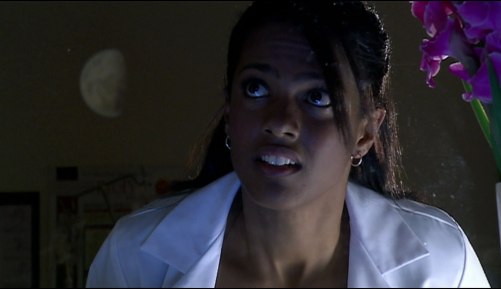
“Smith And Jones” is the debut episode for Martha Jones (Freema Agyeman), the new companion for Series 3 and a major recurring character throughout the latter half of the RTD era. Martha is a hardworking, dedicated medical student from London, and I quite like her. Since Russell loved to give his companions dysfunctional families and troubled home lives to gain audience sympathy for them, Martha’s parents have been divorced on ugly terms for years by the start of the season, leaving a sharp divide in the Jones family since their kids obviously took sides in the fallout. Martha’s sister, Tish, flocked to their mother, and her brother, Leo, backed up their father. It’s implied that Martha, the middle child of the three, has been the glue keeping everyone together and keeping everyone civil for years, as the only sane woman of the group.
Her introductory scenes really do foreshadow a recurring theme with her character: she’s a very reliable person in a way that’s often overlooked and easy to take for granted. Martha is a friendly, warmhearted, outgoing person who treats everyone she encounters kindly, unless they give her a reason not to. She’s a very pragmatic, intelligent and rational person, not only when it comes to her knowledge of the human body, but also when it comes to acknowledging the strange and bizarre. She’s willing to accept impossible things at face value like alien life, even if she doesn’t quite believe in them, if it means she has a chance to help other people and ensure their safety, since Martha’s altruistic streak is the reason why she decided to become a doctor. Despite the utter chaos at work in the episode’s main plot, Martha still makes time to take some important things into account: like admiring the beauty of something very few people ever get to see, or paying respect to her dead boss who just got murdered.
Martha is scolded several times early on by her superior for not following proper protocol as a doctor in training, but she’s given the chance to prove her merit as a woman of medicine and a potential companion throughout this adventure on the moon. Make no mistake, Martha is every bit as terrified as everyone else in the hospital as time starts to run out, but unlike her co-workers, she doesn’t crack under pressure when she knows her patients need her, and she’s willing to take a stand against the Judoon and the Plasmavore in the eleventh hour. Which comes to a head when the Doctor gives her the job of being a distraction and leaves her to stand on her own for a while, followed by her using her medical training to save the Doctor’s life so he can save everyone else’s. Martha is quite the brave lass.
Over the course of this episode, Martha witnesses firsthand how incredible and dependable the Doctor is, and she gains both respect for him and a faith in his abilities that will carry her throughout the season in all sorts of difficult spots. Martha is a bit different from the other two main companions of the RTD era when it comes to her motivations. Rose and Donna flew away with the Doctor because they were both deeply unhappy with where their lives were at, to the point of feeling empty; they didn’t see a fulfilling future ahead of them at home. Martha loves what she does, she’s got her life together and she has a promising career ahead of her. She mainly agrees to travel in the TARDIS because no person with a sense of adventure would pass up a chance to travel in time, it would be an incredibly fun experience, and because she’s started to develop a not so subtle crush on the Doctor. After their experience on the moon, Martha has grown attracted to the handsome and mysterious man and she’s hoping something will develop between them, while Ten is only looking for friendship (and he’s being incredibly reluctant about forming that), so this voyage is going to get pretty awkward and strained.
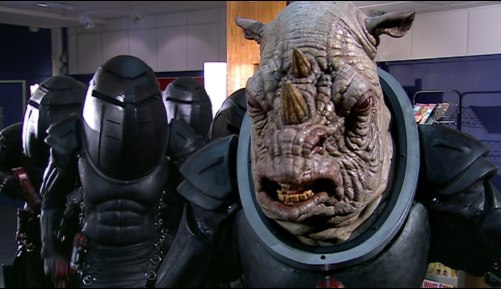
Something I admire about Series 3 is that every episode features some sort of foreshadowing for the events of the three-part finale: not just in terms of arc words like the Face of Boe’s warning and the repeated mention of Mr. Saxon, or physical clues like the fob watch in “Human Nature”, but also thematically. In “Smith And Jones’s” case, you have an innocuous, villainous senior citizen who proves to be much than what she seems when she lets her kindly old lady mask drop. The villain of the episode is the Plasmavore: an alien, bloodsucking parasite disguised as a regular senior citizen hiding out on Earth from the law after she attacked royalty. When cornered, she decides she’ll either escape under everyone’s noses, or she’ll take everyone else down with her – as criminals often do.
Tailing her in close quarters are the Judoon – one of Russell T. Davies’ better creations when it comes to his minor antagonists – who offer us an interesting look at how twisted, clinical, detached and weirdly efficient alien morality can get in the Whoniverse. The Judoon are bounty hunters: recognized, weaponized authority figures who act as mercenaries for hire. The hulking rhinos in leather are big on muscle and short on brain, and they bring criminals to justice across the universe for both world leaders and the Shadow Proclamation. Of course, the Judoon have a rather warped sense of justice. Unlike many other aliens we’ve encountered in this series, the giant space rhinos won’t go out of their way to slaughter humans for fun or for sport, but they won’t hesitate to kill anyone who tries to obstruct justice, or let hundreds of people die as collateral damage of a mission gone wrong. Their only concern is following protocol and completing their mission, and they’re one of the best examples you’ll find of lawful neutral characters in the Whoniverse.
“Smith And Jones” is helmed by Charles Palmer, who provides a wide variety of perspectives to give a fast-paced episode all the momentum that it needs. There is some top-notch, efficient editing in this episode, involving a lot of quick cuts and sideways panning: like the early scenes of Martha arguing with her family over the phone, or the slabs sending the Doctor and Martha on a good chase through the hospital’s hallways. Since the bulk of this episode is set on the moon, there’s a lot of green screen from the Mill used in “Smith and Jones”, with varying levels of success on creating an illusion depending on the scene, particularly during Ten and Martha’s chat on the hospital balcony.
After Murray Gold officially gave the Tenth Doctor his own theme (“The Doctor Forever”) in the previous episode, he immediately set to work writing adrenaline-filled variations on it in this one, for the various chase scenes the Judoon and the slabs lead the Doctor and Martha on through the hospital. As the series opener, “Smith and Jones” also features the debut of a new leitmotif, “Martha’s Theme“, one of three companion themes in Doctor Who that’s performed by a vocalist (with the other two being “Amy’s Theme” and “Clara’s Theme”). Her motif suits her well: it’s pining, inquisitive, wondrous, sturdy, and a bit sassy. Murray always liked to plant the seeds of a companion’s theme early on and bring it to their fruition when they started to realize their true potential, so while hints of “Martha’s Theme” can be found in her introductory scenes, it doesn’t fully blossom until the coda, where she gets an official invitation to board the TARDIS and the expansion of her new worldview is complete. “Martha’s Theme” paints a picture of someone who’s pretty brilliant but isn’t really sure of themselves, which sets up a lovely musical bookend at the end of the season when Martha’s journey is complete and she’s become a much stronger person.
“Smith And Jones” is a pretty fantastic series opener from Russell T. Davies and an exciting start to Tennant’s sophomore season as the Doctor, with plenty more grand adventures to come.
Rating: 8/10.
Side-Notes:
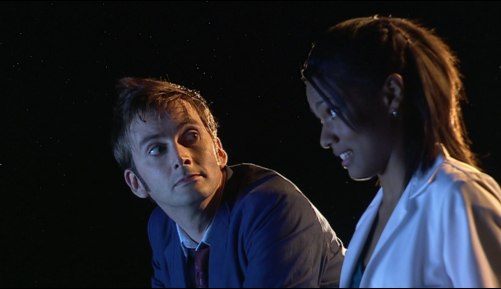
* “Hi, Martha, hi! Big kiss, lots of love, see you at the party, babe. Now, take me shopping, big boy”.
* “Benjamin Franklin. My mate, Ben. That was a day and a half. I got rope burns off that kite, and then I got soaked. And then I got electrocuted”.
* There’s a shot of all the patients in the hospital screaming when they realize they’re trapped on the moon that’s supposed to be sad and tense, but the acting from those extras is so over-the-top and so unconvincing that it winds up being completely hilarious instead.
* “Fancy going out?” “Okay” “We might die” “We might not” “Good. Come on then”.
* “What, people call you the Doctor?” “Yeah” “Well, I’m not. As far as I’m concerned, you’ve got to earn that title” “Well, I’d better make a start, then”.
* “Who are you?” “Oh, I’m a survivor, Mister Stoker. At any cost. Look, I’ve even brought a straw“.
* “If they’re police, are we under arrest? Are we trespassing on the moon or something?” “No, but I like that. Good thinking”.
* “Judoon platoon on the moon”.
* “When I say now, press the button!” “But I don’t know which one!” “Then find out!” When all else fails, always read the manual.
* “You’re completely mad” “You’re right. I look daft with one shoe”.
* “Haven’t you got back-up? You must have a partner or something?” “Oh, humans. We’re stuck on the moon running out of air with Judoon and a bloodsucking criminal, you’re asking personal questions? Come on”.
* “You’re quite the funny man. And yet, I think, laughing on purpose at the darkness. I think it’s time you found some peace”.
* “You will need this” “What’s that for?” “Compensation”.
* “Enjoy your victory, Judoon, because you’re going to burn with me! BURN IN HELL!!!” Dear God, that was funny. Also, unintentional foreshadowing to “42“.
* “You can’t go! THAT THING’S GONNA EXPLODE AND IT’S YOUR FAULT!!!” One thing you’ll discover over the course of Series 3 is that Freema Agyeman has a lot of lung-power.
* Can we talk about how Ten almost died from severe blood-loss, and then Martha helps him out by giving him CPR. Um, what? How does that even work?
* “It’s raining, Martha. It’s raining on the moon”.
* “No, but, that was this morning. Did you? Oh, my God, you can travel in time! But hold on. If you could see me this morning, why didn’t you tell me not to go in to work?” “Crossing into established events is strictly forbidden. Except for cheap tricks”.
* “Welcome aboard, Ms. Jones!” “It’s my pleasure, Mr. Smith!”.
Further Reading:
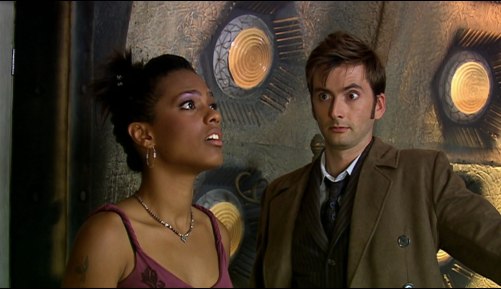

Pingback: Doctor Who: The Shakespeare Code (2007) | The Cool Kat's Reviews
Pingback: Doctor Who: Gridlock (2007) | The Cool Kat's Reviews
Pingback: Doctor Who: The Lazarus Experiment (2007) | The Cool Kat's Reviews
Pingback: Doctor Who: 42 (2007) | The Cool Kat's Reviews
Pingback: Doctor Who: Human Nature / The Family Of Blood (2007) | The Cool Kat's Reviews
Pingback: Doctor Who: Blink (2007) Review | The Cool Kat's Reviews
Pingback: Doctor Who: Partners In Crime (2008) | The Cool Kat's Reviews
Pingback: Doctor Who: Planet Of The Dead (2009) | The Cool Kat's Reviews